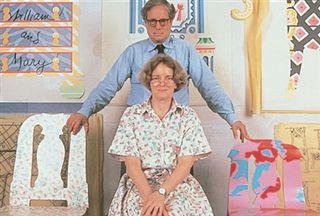
En una carta del jurado de este año del premio Pritzker, firmada por el presidente del mismo Lord Peter Palumbo, dan a conocer su postura acerca de la popular petición organizada para que se le otorgara el reconocimiento del premio pritzker retroactivamente a la socia de Robert Venturi, premio Pritzker 1991.
Dirigida a las dos organizadoras de la petición Arielle Assouline-Lichten y Caroline James, en ella explican que después de extensivamente debatir sobre el tema, el jurado no puede adjudicar un premio retroactivamente. El jurado está formado en cada año por personalidades diferentes y no sería correcto que un jurado «revisara» la decisión de otro. Decisión que fié tomada en una época, por unas personas y en un contexto temporal, cultural singular.
Enfatiza la carta que el premio es otorgado por el volumen de aportación de un arquitecto, lo que sigue haciendo elegible a la Sra. Scott-Brown.
Robert Venturi, se graduó cum laude de la universidad de Princeton en 1947 tres años después recibía su Master in Fine Arts MFA de la misma universidad. Trabajó con Sarinenn, Kahn y algunos otros en 1954 ganó la beca de investigación de la academia Americana de Roma y a su vuelta comienza a enseñar con Louis Kahn en la Universidad de Pensilvannia. En 1966 escribe Complejidad y Contradicción, considerado como uno de los tratados más importantes del siglo XX y se va a dar clases a Yale de donde en 1972 sale Learning from las Vegas.
En 1960 funda la firma Venturi and Short, que luego sería Venturi-Ranch en 1964 a la que se une Denise como socia a cargo de planeamiento en 1969 cambiando el nombre a Venturi, Rauch and Scott Brown. Dos años antes del premio en 1989, renuncia John Raunch y fundan Venturi, Scott Brown and Associates
Te dejo el texto oficial completo que nos han enviado desde la oficina de relaciones publicas del premio, después del sigue leyendo
June 14, 2013
Dear Arielle Assouline-Lichten and Caroline James,
Thank you for sending your petitions and letters, and those of others, about Ms. Denise Scott Brown and the Pritzker Architecture Prize. Insofar as you have in mind a retroactive award of the prize to Ms. Scott Brown, the present jury cannot do so. Pritzker juries, over time, are made up of different individuals, each of whom does his or her best to find the most highly-qualified candidate. A later jury cannot re-open, or second guess the work of an earlier jury, and none has ever done so.
Let us assure you, however, that Ms. Scott Brown remains eligible for the Pritzker Award. That award is given on the basis of an architect’s total body of built work. Ms. Scott Brown has a long and distinguished career of architectural accomplishment. It will be up to present and future juries to determine who among the many architects practicing throughout the world receives future awards. Not every knowledgeable observer always agrees with the jury’s selection. But the jury will continue to do its best to select solely upon the basis of the quality of the architect’s record.
That said, we should like to thank you for calling directly to our attention a more general problem, namely that of assuring women a fair and equal place within the profession. To provide that assurance is, of course, an obligation embraced by every part of the profession, from the schools that might first encourage students to enter the profession to the architectural firms that must facilitate the ability of women to fulfill their potential as architects. We believe that one particular role that the Pritzker Jury must fulfill, in this respect, is that of keeping in mind the fact that certain recommendations or discussions relating to architectural creation are often a reflection of particular times or places, which may reflect cultural biases that underplay a woman’s role in the creative process. Where this occurs, we must, and we do, take such matters into account.
Your communications remind us of this obligation, and we appreciate your sending them. Insofar, however, as they ask us to reopen the decision-making process of a previous jury, we cannot do so.
Yours sincerely,
Lord Peter Palumbo, Chair,
On behalf of the Jury of the 2013 Pritzker Architecture Prize
Ms. Arielle Assouline-Lichten
Ms. Caroline James
Women in Design
Harvard Graduate School of Design Cambridge, MA 02138
The 2013 Jury of The Pritzker Architecture Prize is Lord Peter Palumbo (Chair), Alejandro Aravena, Stephen Breyer, Yung Ho Chang, Kristin Feireiss, Glenn Murcutt, and Juhani Pallasmaa, Ratan N. Tata. Martha Thorne is Executive Director.
